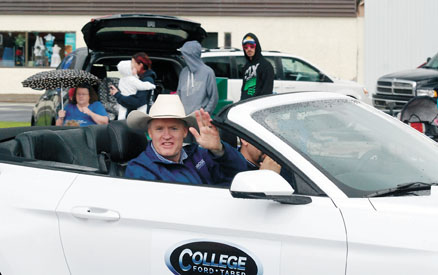Current Temperature
14.7°C
Summer a busy time for Hunter with portfolio
Posted on August 14, 2019 by Taber Times TIMES FILE PHOTO
TIMES FILE PHOTOBy Trevor Busch
Taber Times
tbusch@tabertimes.com
With a new ministerial portfolio placing increasing demands on his time, Taber-Warner MLA Grant Hunter has been spending much of his summer in Edmonton.
“In terms of summer, I haven’t had a summer yet — back to back meetings obviously,” said Hunter, who also serves as associate minister of Red Tape Reduction. “What we’re doing today (Aug. 8) actually is this is the second panel I’ve set up in terms of red tape reduction strategy. Oil and gas is happening today in Calgary, we’re setting up a panel to discuss how we can cut red tape there. We did our first tourism and hospitality panel a few days ago in Edmonton.”
Despite a busy schedule, Hunter plans to attend as much of next week’s Cornfest celebrations as he can.
“The goal is to be there. How much I’m not sure, or times, just because of being a minister and trying to get my head around the red tape reduction approaches, it’s a monumental task that I have to lead. We’re figuring out how to do it. But I plan on being there for the parade for sure, and there’s another event I’d like to get to as well — Cornfest is fantastic, I love Cornfest — I’ll be there as much as I can.”
With Premier Jason Kenney reviewing his government’s achievements in its first 100 days in office last week, Hunter reflected on what he has heard from constituents about his government’s record since taking office in early 2019.
“It’s a mixed bag. I do definitely hear people say thank you very much for taking a reasonable approach to looking deeply into where we’re at and what we need to do. I hear thank you for moving quickly, we just did our 100 days announcement, and I think we are moving quickly to bring forward those 375 platform commitments that we made. But there’s also people that are worried as well. I do hear people that say the future is uncertain, what are you guys going to do, are you going to cut us? And I get that they’re concerned. But I’m asking people to please be patient, to recognize that we have a government to run — schools are still going to be built, hospitals are still going to be built, our services are still going to be provided — we just have to be able to figure out where we’re at, and how to be able to move forward in a sustainable way.”
Although recently devastated by a heavy hail and wind storm in the Taber area, Hunter reports harvest is shaping up nicely in the western parts of Taber-Warner.
“In the west it looks good, in the east it doesn’t look so good, dry they’ve had a few years of difficult weather. So it’s tough for the guys in the east of our riding, for sure, 40 Mile (County) has really been hit hard.”
Hunter described some of the methodology and approach his ministry staff is taking to reviews of government regulations as part of his mandate to reduce red tape.
“It’s an associate ministry, so it’s under the Treasury Board and Finance. So we have a really small group — I like to call it a ‘SWAT team’ — but we’ve got a very effective team to try to address how submissions come in, how to process them, how to be able to vet them to see whether or not there’s something we can do, if there’s quick wins or deep dives we need to do. We’re trying to change the focus of our government, and the focus of Albertans, in that rather than looking at legislation, there’s a process — someone comes with a problem and says we need to fix this — and then the government puts together a process to fix it. We’re trying to look at it from an outcomes perspective.”
A one-size-fits-all approach to fixing a problem with a legislative solution can often have unintended consequences on the ‘good actors’ the solution wasn’t intending to target, argues Hunter.
“So what is the outcome? Who is affected? How broadly is this affecting the population? Unfortunately what has happened far too often is we have a regulation or an idea that comes forward, a legitimate problem, and a good-meaning department leader will say we need to fix this, and they’ll write the regulations and the legislation for it. But unfortunately, yes it did punish the people that are the bad actors, but it also punishes the good actors,” said Hunter. “So we need to change the way we look at legislation. We need to start looking at it from the perspective of we’ve got one to 10 per cent that are the bad actors, lets punish those guys. But let’s free up those innovators and job creators so they can do what they do best, and that’s create jobs. That’s the paradigm shift, and what we’ve seen in B.C., and what they were successfully able to do in B.C. And that’s what we’re trying to create in Alberta here as well.”
Leave a Reply
You must be logged in to post a comment.

